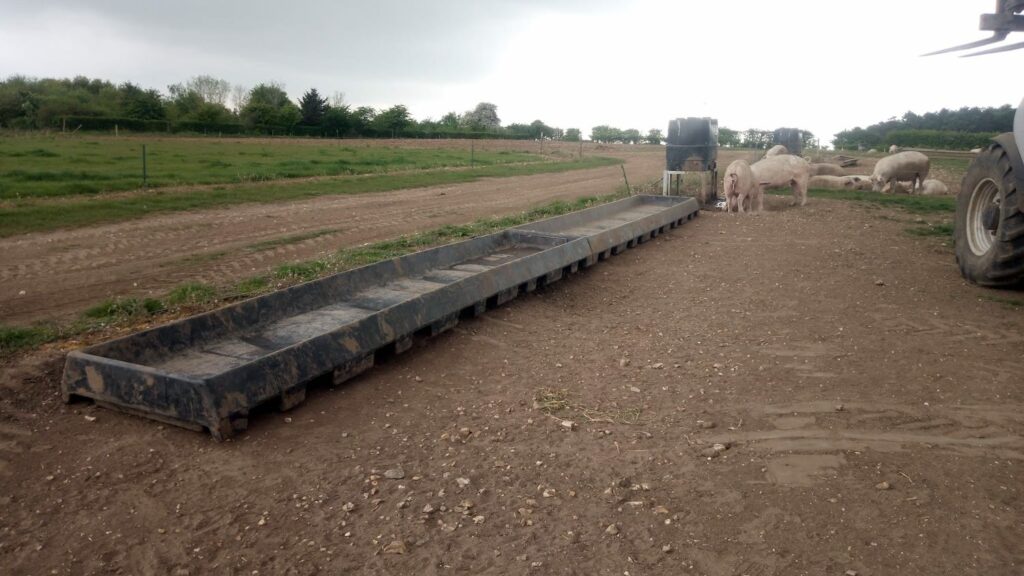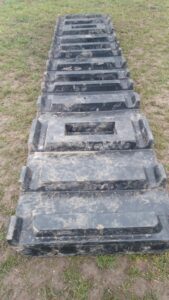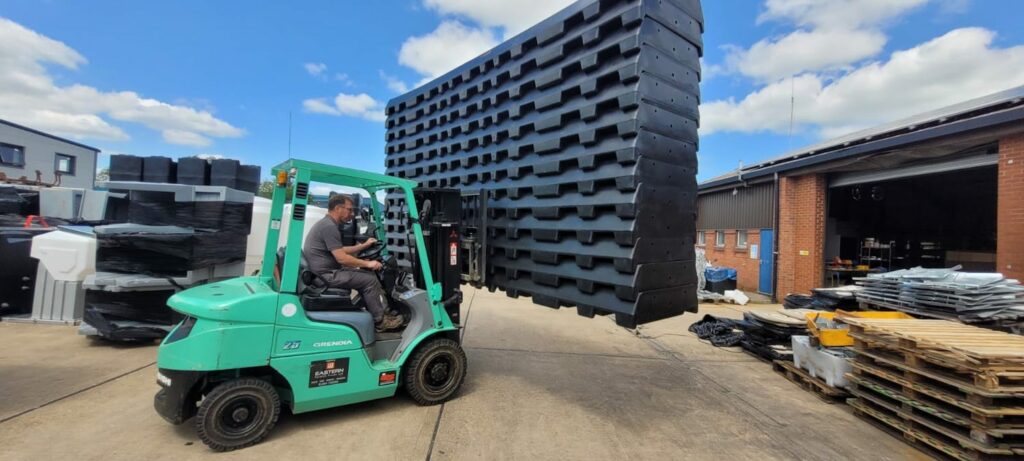Plastic long-troughs proving a “safe, smooth, stackable success”
13th December 2022
Investing in long-troughs to feed outdoor sows can significantly reduce costs, cut feed waste and help counter excessive nutrient leeching in soils. It’s also more hygienic and can reduce the bird and vermin populations visiting and colonising a pig unit in search of food, according to Con-Tented Products.

Con-Tented Products plastic Long Troughs are “precision-moulded, robust, corrosion-free, pig proof, ergonomic and require zero maintenance”.
“It’s estimated that trough feeding, compared to scattering sow rolls on the ground, reduces waste by around 15%. Some units on marginal soil types say they’re saving around 0.5kg of feed per sow per day, which is a considerable improvement in efficiency cost-savings,” says Jamie Macdonald of Con-Tented Products.
The company has been evaluating trough designs for some time and now provides a robust, economic alternative to metal options. Its long-trough, manufactured from recycled/recyclable polyethylene, incorporates the same intrinsic high-quality features of Con-Tented’s range of huts, water tanks/drinkers and feeders. They are UV/temperature stable and will not warp or crack in extreme heat or cold temperatures; they’re maintenance-free and rust proof; and will also stack together, fitting one of top of the other, enabling multiple units to be moved in unison with a fork-lift/telehandler, Con-Tented says.
Launched at the British Pig and Poultry Fair in May 2022, the plastic troughs are fast becoming a best seller.
“We’ve been careful to consider the economics in relation to what producers expect from a practical perspective. We’re finding the functionality and longevity of our long-trough is rather better than metal options, no matter what type of feed you use. What we’re offering is a competitively priced, well-designed trough that’s virtually indestructible,” explains Jamie.

The uniquely-designed, cleated base provides exceptional contact with the ground and keeps them anchored and stable on uneven surfaces.
Con-Tented’s design spec is the culmination of extensive assessments carried out with a number of commercial units, spanning a good few years. The precision-moulded troughs are robust, corrosion-free, pig proof, ergonomic and require zero maintenance, the company says.
On site they’re proving sturdy and easy to position/handle due to their uniquely-designed, cleated base which provides “exceptional” contact with the ground and keeps them anchored and stable even if the surface is irregular/unlevel. The troughs don’t ‘see-saw’ or drift, which in practice has been found to improve accuracy when depositing feeding and also aid sow confidence with shy animals. Their plastic construction is non-conductive, so they won’t become ‘live’ or cause a power loss if they do come into contact with an electric fence line.
The troughs come complete with integral risers, to keep them above any mud, and they have drainage outlets and pre-positioned bolt holes to allow single units to be joined end-to-end in series if required. Each measure 4.7m x 0.8m wide, so can feed up to 12 sows (six-a-side), and feature a smooth, welfare-friendly surface with rolled edges and rounded corners to prevent injury to animals.
Farm-led design
LSB Pigs in Norfolk has helped Con-Tented refine their design and farm manager Rob Macgregor reports “exceptional durability” plus many other advantages.
“We’ve used steel toughs since 2012; they’ve done a good job helping us cut out a considerable amount of feed waste, but they’re not without their problems. We wanted to develop a plastic alternative as we want maintenance-free equipment where possible. We don’t have much time or labour available for repair work,” Rob explains.
Since using the plastic toughs, staff have noticed how noise level at feeding time is considerably less and how the plastic troughs are less ‘mobile’ than the steel ones.
“We feed along a fence line, and being able to bolt these plastic troughs together in series is a bonus. They sit firm and don’t slide around, whereas the metal ones would move, warp and fracture. On reflection, we’ve spent a lot of time removing damaged troughs from paddocks and repairing them,” he adds.
Another key issue has been nutrient build up in the soil around feeding sites – something LSB has been evaluating within a soil protection/water quality project it’s been involved with for almost three years.

Multiple Long Troughs are easily moved in unison with a fork-lift/telehandler.
“With such free-draining land, we are learning to be more mindful of water quality and how we might manage things a little better. We’re considering how feeding sows in the same place might affect nitrate and mineral concentrations in the soil around those areas and if that has any bearing on leaching. Using troughs and repositioning them regularly does reduce some of these risks and the ability to simply stack, load and move these plastic ones makes the job easier, so it’s more likely to be done,” says Rob.
Other advantages have been faster, more accurate feeding as there’s no stoppages to realign troughs along the fence and/or remove damaged equipment, which has helped reduce labour/operation costs and fuel consumption. Also, having a more orderly feeding routine has meant sows are much calmer when fed and that has benefitted routine tasks including vaccinations, scanning and condition scoring – all subtle improvements that do contribute to efficiency and much easier herd management.
| Plastic plus points – top 10 benefits of Con-Tended Products Long-Troughs
1. Made from 100kg recycled polyethylene, which is 100% recyclable 2. Strong, robust and UV and temperature stable 3. Bolt together or over top joiner 4. 15% feed saving over floor feeding 5. No ground pollution compared to scattering feed on ground 6. Reduced bird flocks and other visiting vermin 7. Space for 12 sows to feed when using both sides – 0.75m per pig allowance 8. Smooth surfaces, rolled edges, rounded corners to eliminate potential injuries 9. Stackable, easy to move and handle 10. Unique cleated base that contours to the land, stops ‘seesaw’ action, reduces slippage and makes it more difficult for pigs to move or overturn. |
